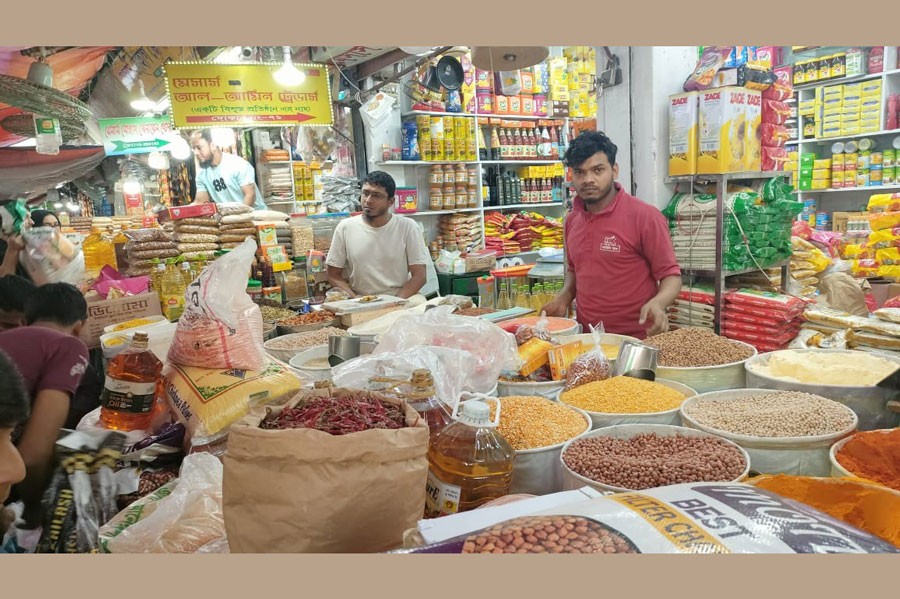
Published :
Updated :

The prices of rice, fresh fruits, lemon, chicken, meat and fish have surged in Dhaka ahead of the holy month of Ramadan, while those of chickpeas, pulses, dates, puffed rice (muri), onion, garlic and various vegetables have declined.
On Thursday, kitchen markets across the capital witnessed a heavy influx of shoppers, reflecting the usual pre-Ramadan demand surge. Many consumers expressed frustration over the rising prices of essential commodities, particularly fish and meat.
A visit to key kitchen markets in Dhaka, including Karwan Bazar, Mohakhali, Hatirpool, Shantinagar, Malibagh, Rampura and Banasree, revealed price variations depending on location.
Consumers noted that while some Ramadan essentials have remained stable, the prices of daily consumption items have increased despite government measures such as tax and VAT reductions.
The price of fine-quality miniket rice has risen by Tk 3 to 4 per kg this week, while coarse rice has increased by Tk 2 to 3 per kg. Premium-quality miniket rice is being sold at Tk 86 to 90 per kg at the retail level, while coarse rice is available for Tk 58 to 65 per kg.
Chickpea prices have declined by Tk 10 to 15 per kg, now selling at Tk 100 to 110 per kg, depending on quality. Different types of pulses, including lentils, peas and Mung beans, are priced between Tk 95 and 150 per kg.
The price of edible oil remains stable, though traders report a short supply of bottled soybean oil. Loose palm oil is selling at Tk 160 per kg, while bottled soybean oil is priced at Tk 170 per litre.
The prices of popular Ramadan beverages and dairy items have increased. Tang (powdered drink) and Ruh Afza (flavoured syrup) have risen by Tk 60 to 100 per kg/litre compared to last year. Tang is now priced at Tk 780 per kg, Ruh Afza at Tk 575 per litre, and powdered milk at Tk 860 per kg.
Fresh fruit prices have also seen an uptrend, rising by Tk 30 to 80 per kg. Oranges are selling at Tk 330 to 380 per kg, Malta at Tk 280 to 300 per kg, green apples at Tk 420 per kg, and China Fuji apples at Tk 330 to 380 per kg. Pomegranates (dalim) range from Tk 450 to 560 per kg, white pears (naspati) from Tk 330 to 360 per kg, green pears at Tk 430 to 500 per kg, and red and black grapes at Tk 550 to 600 per kg.
Dates are being sold at Karwanbazar for Tk 400 to 1600 per kg, depending on quality and brand. However, prices have dropped by Tk 60 to 200 per kg ahead of Ramadan.
Traders claim that the government is levying Tk 136 in taxes on every Tk 100 worth of imported fruit, preventing them from reducing prices. As a result, domestic fruit prices have also increased. Thai papaya is selling at Tk 150 per kg, guava at Tk 90 to 120 per kg, bananas at Tk 80 to 120 per dozen, and green coconuts (daab) at Tk 100 to 160 per piece.
Bangladeshi traders import 38 types of fruit from 22 countries worldwide. Of these, 95 per cent are apples, malta, oranges, grapes, and pineapples. The remaining 5.0 per cent include pears, Kinnow, Kadbel, avocados, Rambutan and kiwis.
According to the National Board of Revenue (NBR), customs duties were increased in two phases for FY2024-25.
The first phase raised duties to 118.80 per cent, while the second round increased them further to 136.20 per cent. This means importers now pay customs duties on every Tk 100 worth of fruit.
Chicken prices have risen slightly ahead of Ramadan. Sonali and broiler chicken are now selling at Tk 300 and Tk 220 per kg, up from Tk 290 and Tk 190 per kg, respectively. Mutton prices have increased by Tk 100 per kg, now selling at Tk 1200 per kg in Karwanbazar.
Meanwhile, beef and other meats remain stable, selling at Tk 730 to 780 per kg, depending on quality.
The demand for river fish has increased, with prices ranging from Tk 400 to 1200 per kg, depending on size.
Glulam Rahman, president of the Consumers Association of Bangladesh (CAB), attributed the price hikes to inadequate market monitoring.
"The price of some items has increased despite official data showing high import volumes of essential goods. Authorities must ensure that price hikes are justified. If irregularities are found, dishonest traders should be held accountable to relieve consumers," said the CAB president.


 For all latest news, follow The Financial Express Google News channel.
For all latest news, follow The Financial Express Google News channel.